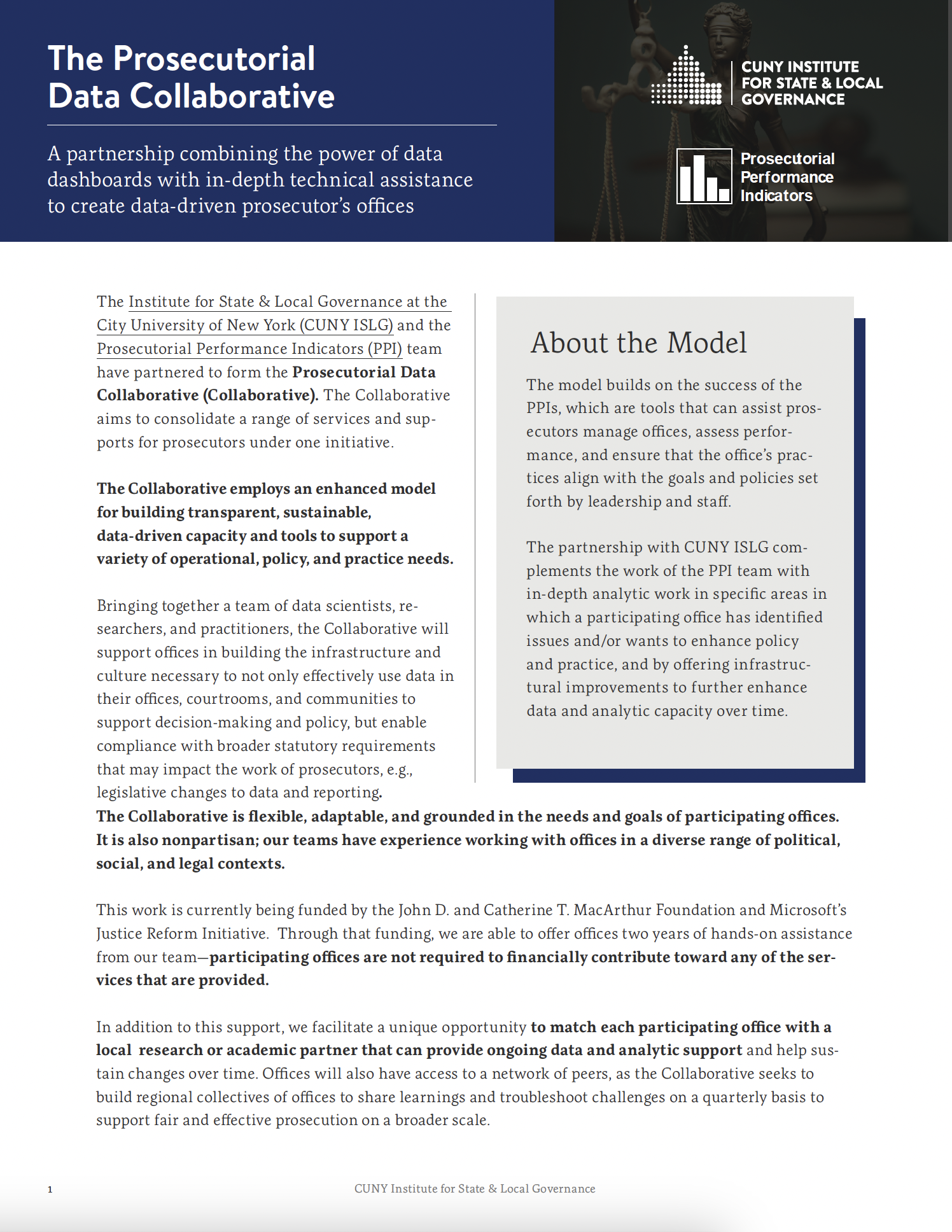CASE STUDY
Data and Transparency
in Prosecution
LOCATION
Nationwide
location
Optimizing Government & Institutions
ACTIVE
2018-present
A portfolio of work focused on building partnerships with prosecutors’ offices across the country that combine the power of data with in-depth technical assistance to create data-driven policy, practice, and operations.
Challenge:
After arrest, prosecutors are the de facto gatekeepers to the criminal legal system. In communities of all political shades and geographical sizes, state and local prosecutor’s offices have a considerable amount of discretion when it comes to who is charged and will move deeper into the system. These decisions can be shaped by equity, safety, efficiency, and/or other community-specific goals. To identify, operationalize, and measure the success of these goals, prosecutors’ offices—alongside other criminal legal system partners—have shifted toward policies and practices grounded in data. Using performance indicators and data-driven operational reviews to achieve concrete and measurable outcomes have become the norm in many agencies and offices; increasingly more are trying to build that capacity, either internally or through external partnerships, to use data to assess and fortify agency functions. Beyond operations, and even more foundational to these agencies’ mandates, is the acknowledgement that data are fundamental to transparency and accountability to the criminal justice system.
The use of data and analysis—for both of improving criminal legal system outcomes and holding them accountable—varies substantially across agencies, and it is particularly underdeveloped at the point of prosecution. Prosecution remains one of the most opaque areas of criminal legal decision-making; the biggest driver is prosecutorial culture itself, combined with outdated technologies and infrastructures to effectively support it. Coupled with the reality that prosecutors have the most discretion and power in the system to determine the fate of people in the criminal legal system, transforming this culture to support data-driven policy and practice is a non-negotiable element of broader change.
Approach:
Over the past several years, there has been movement among prosecutors to reimagine what success means in their offices. This includes diverting folks who may not belong in jail from the system whenever possible to direct resources towards the small share of individuals who contribute the most harm to our communities. Making change at the point of prosecution requires commitment from prosecutorial leaders to examine their policies and practices and identify and advance those that lead to more equitable, effective, and safer outcomes.
To support, enhance, and sustain these efforts, CUNY ISLG’s experts draw on our research and operational expertise to help prosecution partners develop concrete, practical strategies to build data-driven capacity and tools that can support a variety of operational, policy, and practice needs. We do this through three key types of work—that can work alone or in combination, but that are tailored to each office’s self-identified needs and priorities:
Data and Analytic Capacity-Building
This is a critical foundation for data-informed work. CUNY ISLG’s approach in this area starts with a wellness check of existing data, systems, and analytic capacity, along with an assessment the office’s data and analytic interests and needs. The wellness check is used to inform a set of capacity-building improvements that CUNY ISLG then helps the office prioritize and implement. This work can be broad in scope, toward goals of accountability and transparency across the office, or targeted toward data and analytic capacity in a specific area—e.g., tracking gun cases and their outcomes.
Action Research
CUNY ISLG carries out analysis and research to help prosecutors better understand how decisions are made and the impacts of decisions, policies, and practices on a range of outcomes, including community safety and equity. Findings are then applied in practice, informing the development and implementation of policies and practices that advance equity and address other needs and gaps identified.
Performance measurement
CUNY ISLG helps prosecutorial partners establish performance metrics that speak to key goals and objectives and set up processes and tools to share them both internally and externally.
Across all of these work streams, ISLG strives to ensure that community perspectives are reflected in our research exploration.
Progress:
CUNY ISLG has implemented these approaches with different prosecutors across the country. Below are some key partnerships showcasing our work.
Project Reports
-
In the interest of cultivating a one-stop shop for such services and supports for a broader range of offices, CUNY ISLG partnered with the Prosecutorial Performance Indicators in early 2024 to launch the Prosecutorial Data Collaborative (Collaborative). The Collaborative model builds on the success of the PPIs, which are tools that can assist prosecutors manage offices, assess performance, and ensure that the office’s practices align with the goal and policies set forth by leadership and staff. CUNY ISLG then builds off data points uncovered by the PPI tools, providing complementary in-depth analytic work in specific areas in which a participating office has identified issues and/or wants to enhance policy and practice, and by offering infrastructural improvements to further enhance data and analytic capacity over time.
The Collaborative is flexible, adaptable, and grounded in the needs and goals of partnership offices. Bringing together a team of data scientists, researchers, and practitioners, the Collaborative supports offices in building the infrastructure and culture necessary to not only effectively use data in their offices, courtrooms, and communities to support decision-making and policy, but to enable compliance with broader statutory requirements that may impact the work of prosecutors, e.g., legislative changes to data and reporting. The Collaborative also facilitates the unique opportunity to match each participating office with a local research or academic partner or fellow that can provide ongoing data and analytic support, helping sustain changes over time. Offices also have access to a network of peers.
Bringing together a team of data scientists, researchers, and practitioners, the Collaborative supports offices in building the infrastructure and culture necessary to not only effectively use data in their offices, courtrooms, and communities to support decision-making and policy, but to enable compliance with broader statutory requirements that may impact the work of prosecutors, e.g., legislative changes to data and reporting
This work is currently being funded by the John D. and Catherine T. MacArthur Foundation and Microsoft’s Justice Reform Initiative. Through that funding, we are able to offer offices two years of hands-on assistance from our team—participating offices are not required to financially contribute toward any of the services that are provided. For more information, please read our Initiative Summary.
The Collaborative is non-partisan; our teams have experience working with offices in a diverse range of political, social, and legal contexts. We are currently piloting the Collaborative model with offices in California, a couple of offices in the Great Lakes region, and are looking to expand to others in the mid-West and Northeast. We are also seeking additional funding support to be able to work with a wider collective of offices.
If this type of partnership would be of interest to your office, please let our team know! We would love to discuss the initiative with you and what it can mean to your office in more specifics. There is no cost for you. An initial discussion will not commit you to anything at this stage; we are committed to properly tailoring our work to fit your office needs and contexts and understand the time it takes to build trust and understanding in order to feel most comfortable in moving forward.
CASE STUDY: ALAMEDA COUNTY DISTRICT ATTORNEY’S OFFICE
In early 2024, the Alameda County District Attorney’s Office (ACDAO) in California became a Collaborative partner. Having seen the benefits of the PPIs and data-driven work for other jurisdictions, ACDAO partnered with the Collaborative to expand its data capacity, increase transparency to the public, and effectively prepare for and comply with a series of state-wide statutes that feature criminal legal system data collection and reporting requirements.
The partnership has kicked off with a data culture and diagnostic assessment that provided a foundational understanding of the data and systems that currently exist, as well as where the gaps lay. Work is ongoing to move toward actively, effectively, and impactfully use data to inform decision-making and policy and practice priorities moving forward. In addition, the first phase of a Data Dashboard was published in January 2025, shedding light on the review and prosecution of criminal cases in the county. See the press release for more information
-
In 2018, then-newly elected Brooklyn District Attorney (DA) Eric Gonzalez launched the Justice 2020 Initiative to increase community safety, fairness, and equal justice by transforming office culture to establish community-based alternatives as the default response and focus resources on the cases presenting the most harm—all while engaging the community as partners throughout the process. Those objectives demanded a range of approaches and shifts, including strategies to facilitate a culture of data-driven decision-making and transparency in the Office.
To do this, the office partnered with CUNY ISLG to launch a Data and Transparency Initiative comprising two phases of work. In the first phase, a one-year capacity-building project, CUNY ISLG helped the office identify and implement measures to improve its ability to track, analyze, and apply the data that support its most important policy and practice goals. This resulted in the hiring of a research director, the launch of a new case management system, and creation of numerous report templates.
In the second phase of the project, CUNY ISLG conducted a study to explore and understand racial and ethnic disparities in prosecutorial decision-making, using office administrative data and a review of approximately 300 case files. The full set of findings is summarized in the final report, Justice in Decision-Making. For more on the project as a whole, see the case study page.
Funded by Arnold Ventures and the W.T. Grant Foundation.
-
Like many prosecutor’s offices, the Snohomish County Prosecuting Attorney’s Office had not invested in building sophisticated data and analytic systems—as well as a culture of transparency—to monitor trends related to public safety, incarceration and other outcomes, or to use this information to inform decision-making and promote accountability.
Over a one-year period, CUNY ISLG carried out a comprehensive assessment of the office’s current data and analytic capacity, and worked with system partners to develop and implement a performance metric framework for tracking racial and ethnic disparities at key decision points.
The end goal was a first-of-its-kind Law & Justice Dashboard that provided a comprehensive look at prosecutorial and law enforcement data, showing who is entering the pretrial system, why, and what outcomes follow. This process was iterative and collaborative, incorporating feedback from the Snohomish County Information Technology (IT) Department and other criminal legal system stakeholders in the county, in addition to the Prosecuting Attorney’s Office. CUNY ISLG also worked with the IT Department to provide technical guidance on dashboard layout and design. See the dashboard here, and read about its development here.
Funded by the Microsoft Justice Reform Initiative.
For more information on any of our prosecution work, please contact Jennifer Ferone, Deputy Research Director, at jennifer.ferone@islg.cuny.edu. For interest in the Prosecution Data Collaborative, email Jennifer or fill out the form below.









